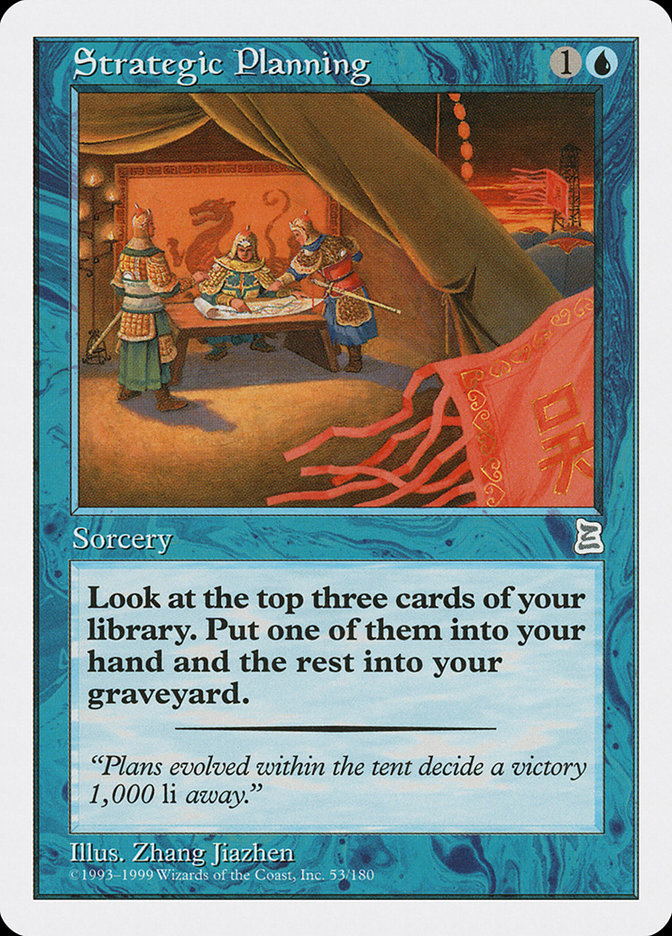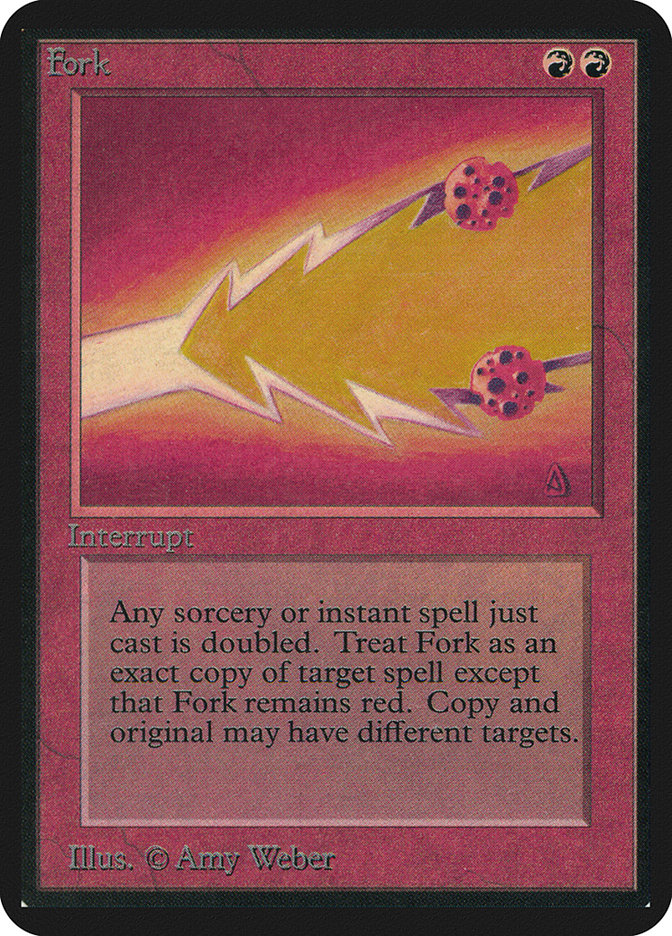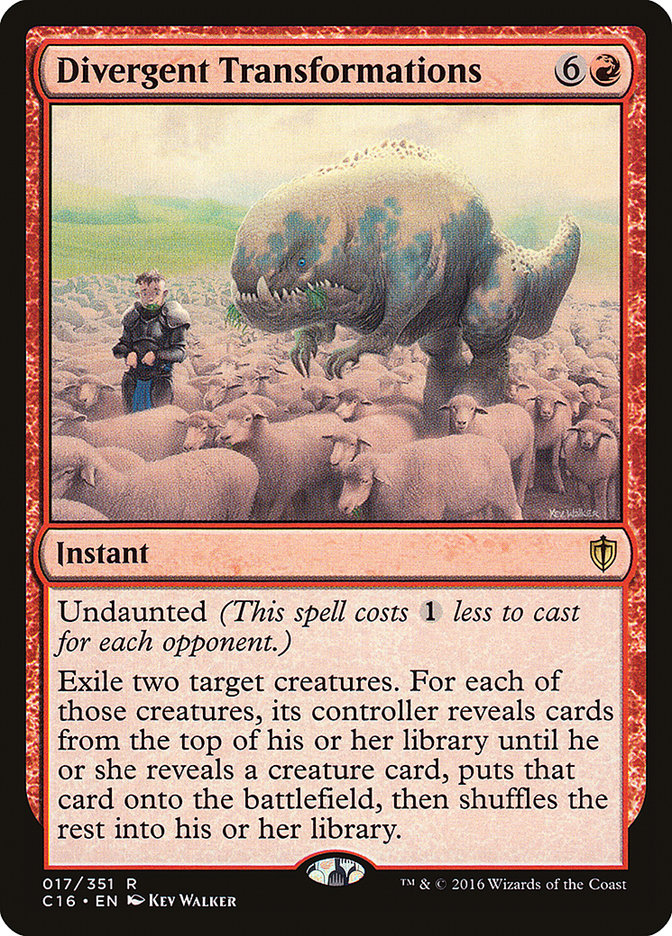Research // Development Carta MTG
| El coste de maná | |
| Costo de maná convertido | 7 |
| Rareza | Extraña |
| Tipo | Instantáneo |
| Liberado | 2006-05-05 |
| Coleccione símbolo | |
| Coleccione nombre | Dissension |
| Coleccione código | DIS |
| Número | 155 |
| Frame | 2003 |
| Disposición | Dividir |
| Border | Negra |
| Ilustrado por | Greg Staples |
Texto de la carta
Pon en juego una ficha de criatura Elemental roja 3/1 a menos que un oponente te permita robar una carta. Repite este proceso dos veces más.
Cartas como Research // Development
Navigating through the intricate phases of card advantage in MTG, Research // Development stands out within its unique dual-card feature. Echoing elements found in the likes of Strategic Planning, which sifts through the top three cards of a deck, providing players the choice to keep one, Research // Development introduces a broader selection at a five-card glimpse. Unlike Strategic Planning, Development doesn’t limit the choice to nonland cards and Research allows another spell to be replicated, albeit from outside the game.
When taking a side-by-side look with Fork, which duplicates any single instant or sorcery spell, Development offers up a craftier counterpart. It may mandate the spell to exist outside the current match, giving an atypical, premeditated angle to gameplay. Divergent Transformations is similarly transformative yet more unpredictable. It exiles two creatures and then manifests top cards from the library into creatures, ramping up the element of surprise
Assessing the multifaceted applications of Research // Development within MTG’s pantheon of spells, it garners recognition for its flexibility and the strategic depth it contributes, setting a distinct standard in deck versatility and potential card advantage strategies.
Card Pros
Card Advantage: Diving into the core benefits of Research // Development, this card grants you a significant edge by allowing you to not only draw a card with the Development side but also to deploy multiple threats into your deck with Research. This dual-aspect design ensures that you stay ahead in resources, making it a versatile choice for maintaining control over the game’s flow.
Resource Acceleration: The strategic depth of Research // Development shines in its ability to churn through your deck, setting up potential for an explosive turn. By filling your deck with copies of potent spells or creatures, you’re effectively accelerating your resources and setting the stage for a powerful play. This can often translate into a formidable board state that your opponent must address.
Instant Speed: The instant speed nature of Development offers a layer of flexibility, showcasing its strength within MTG interactions. This allows you to adapt to the unfolding game, keeping your opponents guessing and forcing them to play around potential responses. This instant speed utility enables you to maximize your mana each turn, whether you’re casting spells on your turn or waiting to disrupt your opponent’s strategy.
Card Cons
Discard Requirement: In the stages of research and development, a card might necessitate players to discard one or more cards. This can hinder a player’s hand and reduce their available options, potentially stripping them of crucial resources they may need later in the game.
Specific Mana Cost: A stringent mana requirement can make a card less flexible, especially if it demands an exact combination of colors. This can limit the card’s inclusion to decks that can consistently generate the specific mana types needed, reducing its overall versatility across different deck builds.
Comparatively High Mana Cost: A card in development might have an elevated mana cost that doesn’t align with its impact on the game. When a card’s effects do not justify its mana expense, it risks being overlooked in favor of lower-costing alternatives that offer similar or greater value, potentially affecting its playability and popularity upon release.
Reasons to Include Research // Development in Your Collection
Versatility: Research // Development offers a unique flexibility, allowing players to dig through their library for answers or beef up their presence on the board with unexpected token creatures.
Combo Potential: The Development side of this card can produce numerous tokens for synergies with mechanics like populate or convoke, while Research can facilitate finding the right pieces for complex combo setups.
Meta-Relevance: With the ability to adapt to various metagames, either through token generation to apply pressure or sifting for keys to outmaneuver opponents, Research // Development remains a strategically advantageous choice.
How to Beat
The process of developing new cards for MTG, particularly in the Research and Development stage, can sometimes yield powerful results that challenge players. Understanding the meta-game, including how cards are crafted and introduced to the ecosystem, is key to finding ways to counter them. Opposition to a potent Research and Development card requires a keen sense of strategic play and deck building finesse.
When facing such cards that have been meticulously designed for impact, consider sideboard options that neutralize their advantages. This might mean including cards that disrupt the opponent’s strategy or using removal spells that can target key pieces, effectively dulling their impact. Assess if counterspells, direct damage, or perhaps hand disruption offers the best line of defense. Adaptability and resource management come to the forefront, demonstrating how understanding of the game’s deeper mechanics is crucial for turning the tides in your favor.
To summarize, overcoming a sophisticated Research and Development card is more than just a single tactic. It is about crafting a versatile strategy that anticipates and dismantles the opponent’s plan, ensuring that you retain control of the game’s direction and momentum.
Donde comprar
Si estás buscando comprar una carta MTG Research // Development de un coleccione específico como Dissension, existen varias opciones confiables que debes considerar. Una de las fuentes principales es tu tienda de juegos local, donde a menudo puedes encontrar paquetes de refuerzo, cartas individuales y mazos preconstruidos de colecciones actuales y pasadas. A menudo ofrecen el beneficio adicional de una comunidad donde puedes intercambiar con otros jugadores.
Para un inventario más amplio, particularmente de colecciones más antiguos, mercados en línea como TCGPlayer, Card Kingdom y Card Market ofrecen amplias selecciones y te permiten buscar cartas de colecciones específicos. Las plataformas de comercio electrónico más grandes como eBay y Amazon también tienen listados de varios vendedores, lo que puede ser un buen lugar para buscar productos sellados y hallazgos raros.
Además, el sitio oficial de Magic suele tener un localizador de tiendas y listas de minoristas para encontrar Wizards of the Productos con licencia costera. Recuerde comprobar la autenticidad y el estado de las cartas al comprarlas, especialmente a vendedores individuales en mercados más grandes.
A continuación se muestra una lista de algunos sitios web de tiendas donde puede comprar las Research // Development y otras cartas MTG:
 COMPRAR
COMPRAR BurnMana es un socio oficial de TCGPlayer
- eBay
- Card Kingdom
- Card Market
- Star City Games
- CoolStuffInc
- MTG Mint Card
- Hareruya
- Troll and Toad
- ABU Games
- Card Hoarder Magic Online
- MTGO Traders Magic Online
Ver productos MTG
Legalidades
Formatos de Magic the Gathering donde Research // Development tiene restricciones
| Formato | Legalidad |
|---|---|
| Commander | Legal |
| Legacy | Legal |
| Modern | Legal |
| Oathbreaker | Legal |
| Vintage | Legal |
| Duel | Legal |
| Predh | Legal |
| Penny | Legal |
Reglas e información
La guía de referencia para las reglas de las cartas Research // Development de Magic: The Gathering proporciona las reglas oficiales, las erratas emitidas, así como un registro de todas las modificaciones funcionales que se han producido.
| Fecha | Texto |
|---|---|
| 2006-05-01 | Development’s effect is repeated three times no matter which option the opponent chooses. The opponent may choose a different option each time. You’ll wind up with three Elemental tokens, two tokens and a card, one token and two cards, or three cards, whichever your opponent chooses. |
| 2006-05-01 | In a multiplayer game, each opponent, in turn, has the option to let you draw a card. If no opponent does, you put a token onto the battlefield. Then the process repeats two more times. A different opponent may let you draw a card each time. |
| 2009-10-01 | A card “from outside the game” may be a card from your collection or a card from your sideboard. In tournament play, you can’t choose a card from your collection. The cards you choose don’t all have to come from the same place. |
| 2009-10-01 | The exile zone is a part of the game, so you can’t get exiled cards. |



